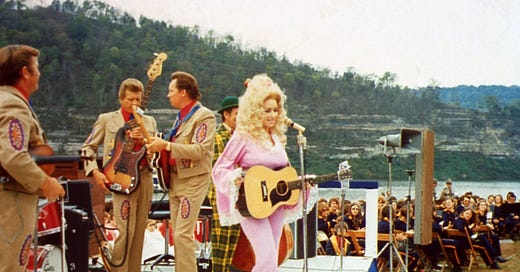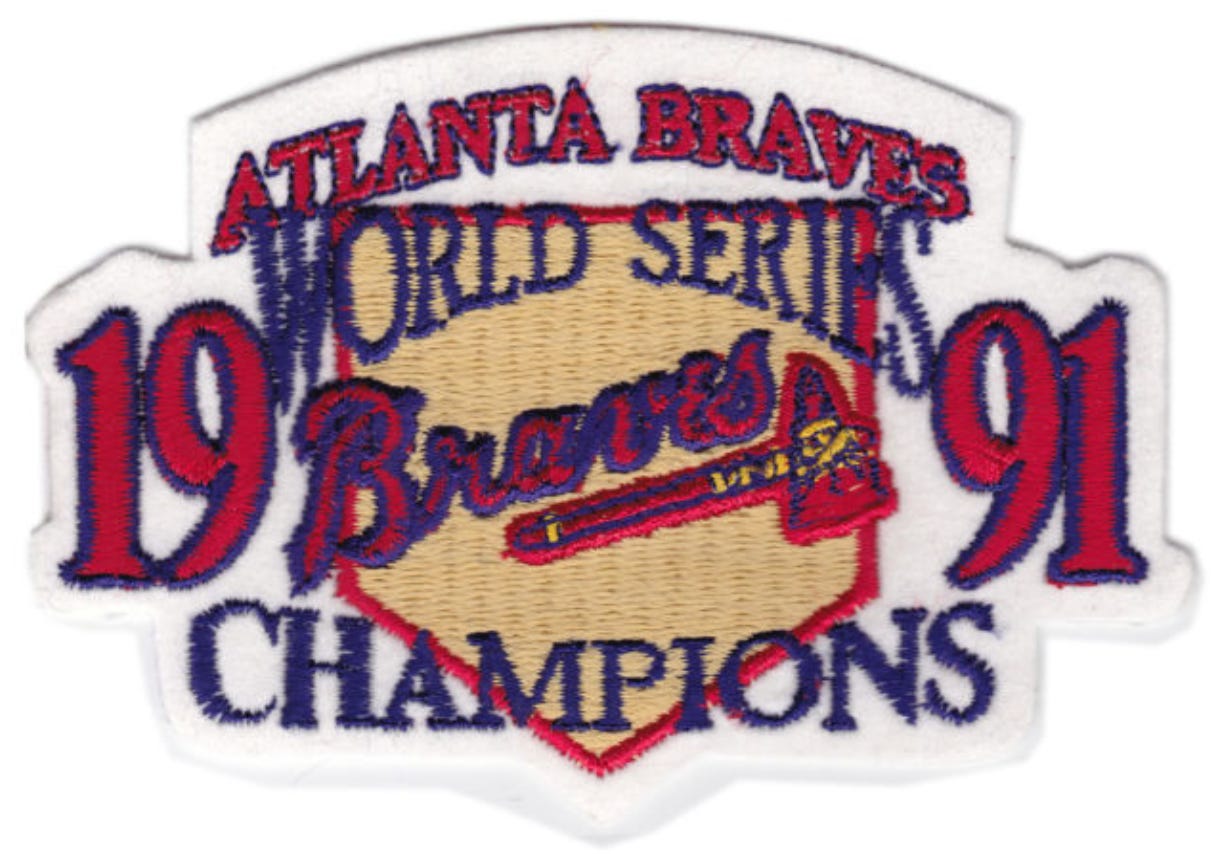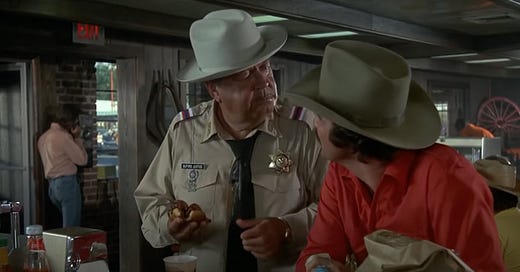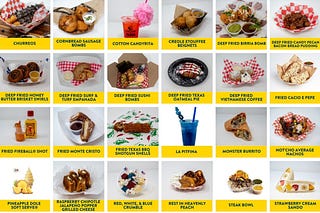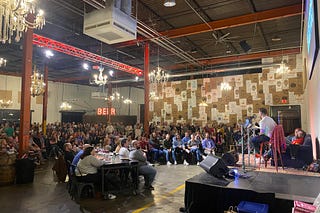

Discover more from Flashlight & A Biscuit
Did Dolly Parton write 'Jolene' and 'I Will Always Love You' on the same day?
Investigating a case study in genius productivity
Welcome to Flashlight & A Biscuit, my Southern culture/sports/music/food offshoot of my work at Yahoo Sports. Thanks for reading, and if you’re new around here, why not subscribe? It’s free and all.
A few years back, I was at Dulles Airport trying to get a few minutes’ peace before dealing with two wriggling children on a flight. I volunteered to go purchase snacks, but used the opportunity — as every momentarily off-duty parent does — to steal a few minutes for myself looking at the rows of airport books. There, I picked up a book entitled “Getting Things Done,” written by a productivity guru named David Allen1. I didn’t know it, but I wasn’t buying a book … I was buying a manifesto.
And so began my descent into The Cult of Productivity, a strange and bizarre world dedicated to streamlining the act of working without focusing on the product. The best way to describe it would be like reading a cookbook that spends 300 pages telling you how to organize your kitchen … and doesn’t give you a single recipe. The Cult of Productivity does have its uses — I could bore the skin off your bones telling you how it’s improved my workflow — but it’s also seductive, so much so that you can spend so much time setting up your workspace that you don’t actually, you know, work.
Productivity freaks love case studies — you may remember that certain Instagram rise-and-grind motivational doofuses spent the first days after March 2020 bloviating that “Shakespeare wrote ‘King Lear’ during a pandemic, what are you gonna do with this gift of time???” Yeah, well, Shakespeare didn’t have Netflix, jackass.
But nothing quite compares to the reverence with which productivity goons approach a certain Dolly Parton anecdote, citing it as proof that if you live the grindstyle, bro, you too can approach genius. You know what I’m talking about by the headline, but let’s lay it out here for the purposes of narrative seamlessness:
Did the great Dolly Parton in fact write “Jolene” and “I Will Always Love You,” two of the greatest songs of the 20th century, on the same day?
Let’s discuss.
I don’t need to introduce Dolly Parton here, do I? National treasure, voice of an angel, sweeter than strawberry pie and always three steps ahead of all of us. The fourth of 12 children, raised in a Tennessee cabin, she carved out a wide path in country music using charm, wit, skill, wigs and her other assets.
In the late 1960s, Porter Wagoner made Dolly2 a recurring guest on The Porter Wagoner Show, and she basically lit the joint on fire with her smile and her songwriting chops. Dolly was already on her way to the stars, but Porter gave her career an early boost. For awhile, it was a fine partnership, but Dolly craved and deserved solo recognition, and by 1973, matters had come to a boil inside Dolly's head. She was so dang popular that she was even being asked to ceremonially open dams, like that one there east of Nashville pictured above, but she was still under Porter's wing. But she knew a change was soon to come.
One afternoon right around this time, Dolly visited her local bank with her husband — the rarely-seen Carl Dean — and observed him getting a little friendly with the bank teller, a beautiful redhead by the name of Jolene. Carl handled Dolly’s business affairs while she was out on the road, you see, and often had occasion to visit the bank. Now, Dolly and Carl are still married to this day, but the last thing you want to do is give a songwriter more material.
So, back to Porter. As he tells it in the documentary “Dolly Parton: Here I Am,”3 Dolly brought him her latest batch of songs about back home, songs with titles like “Daddy’s Working Boots” and “Momma’s Old Black Kettle.” And he wasn't exactly thrilled.
“People don’t care if your momma’s got a kettle or a skillet. Who cares?” Porter said. “You need something that people will listen to. You need to write a song about the most identifiable subject, one about love.”
“OK, smart aleck,” Dolly replied. “I’ll write you a song about love.”
And she came back with this. Go ahead and play it even if you’ve heard it a thousand times before, and imagine hearing it for the first time:
“Dolly,” Porter said, “that song will make you more money and more fame than all your songs put together.”
Now that’s a hell of a story, right? Of course, you’ll note that Porter puts himself right at the center of it, as both motivator and scarily prescient judge of its success. Dolly has recounted it somewhat differently — not directly, of course, that would be impolite — implying that it was about wanting to make a necessary break from Porter, no matter how much she still cared for him and appreciated what he’d done for her.
“I’ve never been a writer that looks for a perfect song. I write because I have to, I love to, I want to,” Dolly says in “Here I Am.” “But there are certain songs I write that I go, ‘Wooo! That’s good!’”
She’s right. “I Will Always Love You” is as pure as music gets, emotion that can melt the coldest heart. Fans have told Dolly they’ve played it at the bedsides of dying relatives in hospitals, for their children’s graduations, for moments when saying “I love you” isn’t enough.
How strong is that song? Elvis himself sang it to Priscilla when they walked out of the courthouse after their divorce. The King wanted to record a version of the song himself, but the ever-grimy Col. Tom Parker demanded half the publishing rights. Dolly, heartbroken but resolute, refused … and it turned out to be one of the savviest business decisions in music industry history, because when Whitney Houston recorded her astoundingly popular version in the 1990s, all that money flowed Dolly’s way.
Houston claimed the version as her own, a distinction Dolly was happy to make. “It’s her record,” she says, “but it’s my song. It didn’t sound like that when I had it. She made me rich!”
And then there’s “Jolene,” the slithery, desperate classic. Give this one a listen, too:
From a songwriting perspective, so much about “Jolene” makes it a fascinating listen. The main, creeping riff is played on a nylon-stringed classical guitar, not the typical twangy steel-stringed country of the day. The song begins with the immortal, pleading chorus, which is an entirely separate melody from the main riff. It’s timeless in both subject and execution.
Through the years, many other singers have tried their hand at “Jolene,” and it’s so good that it can lift the profile of virtually any vocalist. Miley Cyrus, who’s now lived enough life to catch up to the richness of her voice, delivers a resonant version. The White Stripes, as always, slouch in the right direction of the song but don’t stick the landing. If you ever wanted to hear what a Dolly Parton bass drop sounds like, someone named Destructo has your remixed version of “Jolene” right here. There’s even a screamo metal version that honestly sounds fairly badass, a testament to the underlying strength of the song.
So, the central question: did she write both of these classics on the same day? And the answer is … probably! Yeah! Kind of!
The whole “both on the same day” anecdote dates back to 2017, when she told a radio show that she’d found an old cassette of some initial songwriting efforts, and both songs were on that cassette, ergo, they must have been done right around the same time. (We need to hear that cassette.)
Here’s the thing: Dolly has written literally thousands of songs. Friends tell tales of her writing entire songs on napkins at dinner. She’s apparently got thousands of unrecorded or unreleased songs tucked away in Tennessee vaults. And the early ‘70s were a particularly prolific period for her. So it’s entirely possible — likely, even — that she cranked out at least pieces of both songs on the same day.
“If I didn’t write it on the same day, it was during that same week or that period of time when I had that particular set in my little player,” she told GQ in 2020. “It was very possible that it happened.”
So maybe the songs didn’t spring, clearly formed, from Dolly’s forehead one after another on one particularly significant (and profitable) day. But that’s not really the point. The main takeaway from the Dolly story is this: she created, so much and so often, that brilliance found its way out. She didn’t worry about how to write songs, or how to prepare to write songs, or how to organize her life so she could write songs … she just wrote the damn songs.
“These songs were just, ‘Jolene, Jolene!’ and ‘I will always love youuuu,’” Dolly laughs in the documentary, making fun of her own lyrics. “It’s not like I’m a genius or nothing.”
We beg to differ, ma’am.
Let’s wrap this with one more Dolly song. By the 1990s, Dolly was in what appeared to be the downslope of her career but turned out to be just a valley. Like Johnny Cash, Loretta Lynn and other artists of a certain vintage have done, she stopped trying to make music for the times and instead went back to her roots. The result was a bluegrass album, “The Grass Is Blue,” whose title song is just charming as hell. Here it is, part of the ongoing, ever-growing Flashlight & A Biscuit playlist:
Have yourselves a fine week, my friends, and we’ll see you back here next Saturday.
—Jay
(Photo: "Dolly Parton performs at 1973 dedication of Cordell Hull Dam" by NashvilleCorps is licensed under CC BY-SA 2.0.)
This is issue #91 of Flashlight & A Biscuit. Check out all the past issues right here. Feel free to email me with your thoughts, tips and advice. If you’re new around here, jump right to our most-read stories, or check out some of our recent hits:
Wienerman and the Great West Virginia Hot Dog Heist
What happens when “Loserville” starts winning?
Hellfire & White Lightning, Part 2: The daredevil choir boy
What does “Flashlight & A Biscuit” mean, anyway?
And load up a to-go box before you leave:
If you dig this newsletter, share it with your friends. Invite others to the party, everyone’s welcome.
Not to be confused with David Alan Grier, and most definitely not to be confused with David Allan Coe.
Proper journalistic technique would be to refer to her as “Parton” or “Ms. Parton,” but it just feels weird to call her anything but “Dolly,” you know?
Streaming on Netflix. Shakespeare couldn’t watch it, but you can. Eat that, Shakespeare!
Subscribe to Flashlight & A Biscuit
Kick back with some tales of Southern culture, sports, food and music from Jay Busbee. Grill's already hot; drinks are on ice. Pull up a chair.

